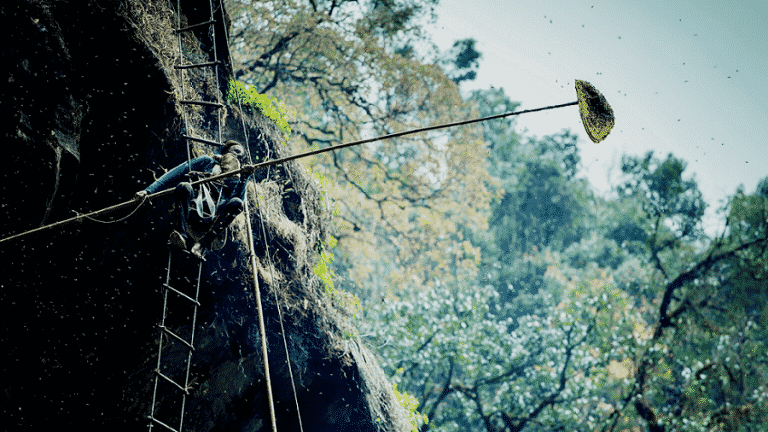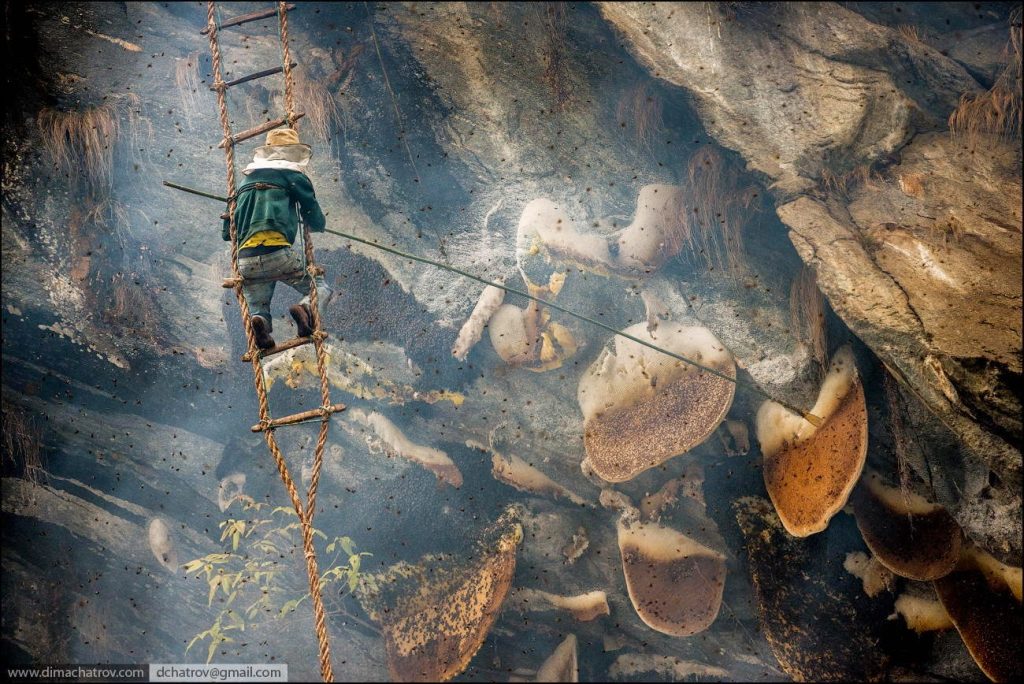Natural beekeeping refers to a more natural and sustainable method of harvesting honey and other byproducts. This approach has become popular in the last few years as the global bee population has started dwindling.
Many people nowadays consider this method as the only ethical thing you can do. Bees in natural beekeeping hives live longer and give better offspring. As such, implementing natural beeping and similar practices is the only way to save these beautiful insects and, with that, the life on Earth.
By using this approach, you’re not only saving bees, but you’re also getting higher-quality products. For example, some of the rarest, most potent types of honey, such as mad honey, are commonly made through natural beekeeping.
In this article, we will talk more about natural beekeeping, why it’s so important, and how to implement it.
Table of Contents
WHAT IS NATURAL BEEKEEPING?
Whenever a wannabe farmer asks me about this method, I always suggest they read “Natural beekeeping: Organic approaches to modern apiculture.” This is an incredible book that teaches you everything you need to know about this practice.
Basically, natural beekeeping is an agricultural philosophy according to which farmers are supposed to give their insects enough space to live, eat, and reproduce. It goes against economically-efficient practices such as frequent hive inspections, bee medication, hive movement, and other things that could interfere with insects’ natural processes.


NATURAL BEEKEEPING IMPORTANCE
Given the sharp reduction in the global bee population, it seems that natural beekeeping has never been as important.
In a nutshell, this process allows bees to live healthy lives. It increases the resilience of a population by improving their behavioral and immune responses. Natural beekeeping allows these insects to survive various pathogens, forage fluctuations, and other hazards.
Through a natural approach, farmers can improve the living conditions of “tame” bees bringing them closer to their counterparts in the wild. Unlike intense bee farming, where insects are exposed to artificial substances, artificial reproduction, and supplementary feeding, natural beekeeping creates a more natural environment.
More and more farmers are trying to implement this method as something that could potentially save the species from extinction.
5 Natural Beekeeping Principles
This is a holistic approach that puts bees first. It’s meant to cater to the insects’ needs allowing the healthy development of a colony and its offspring.
Although some experts might disagree with my classification, natural beekeeping follows five basic principles:
1. Comb
For these insects, everything starts and ends with the comb. In fact, this structure is so biologically unique and is one of the main reasons why experts are so fascinated with these beings.
Combs are made from bees’ bodies and are used as a central neural network of a colony. The health of all these insects is inherently connected to the health of the comb. They use it for reproduction, storing food, and all other functions.
2. Food
Bees create wax and honey by collecting surrounding pollen and nectar. In that regard, the health of a colony is directly connected with the health and vitality of the surrounding flora. Human impact on the local environment can condemn the species.
However, farmers are guilty of an even bigger sin. Many of them use artificial pollen, sugar syrup, and other supplements to increase bees’ productivity. Although these practices might produce short-term results, they eventually cause stress and diseases within the colony, which can also affect the quality of mad honey.
3. Reproduction
Natural reproduction is crucial for the health and sustainability of a colony. It’s also something that can positively affect farmers. Through natural reproduction methods, new queens are able to adapt their physiology to the surrounding environment. As such, they become more resistant to local climate and diseases.
Unlike natural beekeeping, where farmers let things go their natural course, the conventional approach recommends killing the queen. By doing so, the old insect is replaced with a new one, which prevents swarming. This practice causes bees to become docile while increasing honey production.
Unfortunately, this can often cause other issues, potentially endangering the existence of local insects.
4. Chemicals
Like with many other species, humans have decided to expose their bees to various chemicals in an attempt to increase their yields. One of the biggest crimes is using strong chemical products to prevent colony diseases or controlling Varroa mites. These substances are placed in hives.
The problem with these chemicals is that they prevent the evolution and adaptation of the local bees. As time goes by, they become more resistant to antibiotics, which can completely destroy their immune response.
If that wasn’t enough, farmers also use plastic combs which they also place in hives. These items leave a carbon footprint and can contaminate the mad honey and the hive itself.
Natural beekeeping shies away from these practices. Farmers who follow this philosophy let bees evolve by themselves, even if it means a death of a colony. However, the offspring of the groups that manage to survive have much stronger genetics.
5. Intervention
Most farmers are inclined to help their bees when they’re distraught. Even if they have altruistic goals, this often affects insects’ natural processes condemning them in the long run.
Like most wild animals, bees try to stay away from humans and other species. They are solitary creatures that fulfill all their needs by relying on the local environment.
According to natural beekeeping principles, these lovely insects should be left alone to their own devices. If you wish to inspect hives, make sure to do it during spring and summer when the weather conditions are ideal.
As for brood inspections, you can do them three or four during a season. Some experts suggest more often but keep in mind that this can be very stressful for the colony.
How to Engage in Natural Beekeeping?
To implement natural beekeeping methods, you should simply stay away from the hive. The farmer should allow insects to live and reproduce like in their natural environment, with little to no involvement.
Natural beekeepers often use the STUN (Sheer, Total, Utter Neglect) methodology. Although it might sound funny, it’s the best way to explain this approach to a layman. Basically, a farmer should stay away from the hives throughout the year and leave insects to their own devices.
As spring and summer come along, you just visit your favorite pets and collect that natural, mad honey (or whichever honey we’re talking about).
Are there specific types of bees better suited for natural beekeeping?
While every bee species can derive benefits from natural beekeeping methods, it’s worth noting that some types of bees might be more suited to this approach than others. The species of bees that often thrive best under natural beekeeping practices are those that are local or native to a given area.
The rationale for this is straightforward. Local and native bees have spent generations adapting to the specific conditions of their home environment, including climate and local flora. This means they are naturally attuned to the cycle of the seasons, the local diseases or pests they might encounter, and the types of flowers and plants available in their environment for foraging.
Here are the best ways to implement natural beekeeping:
- You should give bees all the space in the world for swarming. This is their natural process of reproduction, which shouldn’t be substituted with anything else.
- Don’t try to alter a hive’s genetics. If a colony can live through the winter, that’s great! However, you shouldn’t try to force the survival of weak insects. In many ways, this can only backfire. Avoid using sugar water and other methods that would give them an unnatural advantage. Although changing genetics might be important in the short run, it’s much better for colonies to grow stronger by weeding out weak genetic traits.
- Similarly, you shouldn’t provide any treatment for varroa mites. A colony will either become resilient to them or perish. Not giving bees any artificial substances will increase the colony’s resistance and enhance the genetics of future generations.
- As previously mentioned, you should seldom visit hives. Furthermore, you should take their honey only during the late summer and spring. Don’t harvest it in the fall, as they’ll need it for survival during the winter.
- Make sure to use natural beekeeping top bar hives and other natural beekeeping supplies. Avoid using plastic pieces for their hives.
Basically, this is an apicentric method of beekeeping that puts the bees’ needs first. Instead of constantly trying to exploit these fantastic insects and using their honey, the farmers are trying to create an environment where they can thrive. More than anything, this is a responsible approach that helps the survival of local colonies.
The most important thing about natural bee farmers is that they see things from a different perspective.
For them, these insects are, first and foremost, powerful pollinators that have a major impact on natural cycles. In other words, they respect bees more for their impact on the environment and less for their products.

 EN
EN